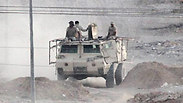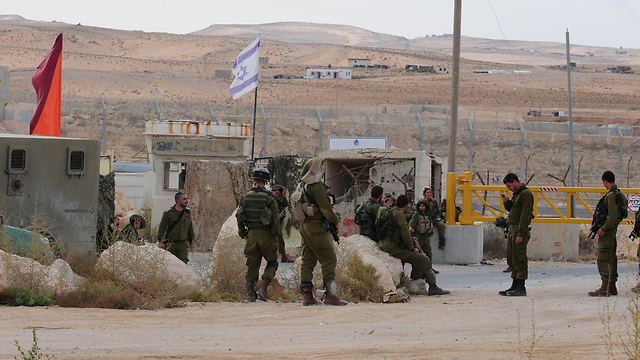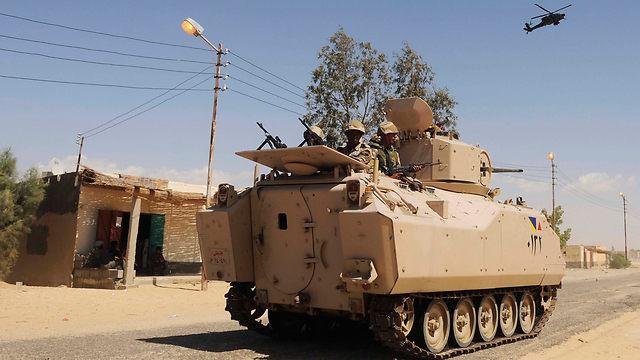
IDF increases presence on Egyptian border
After a day of fighting between the Egyptian army and jihadists in the Sinai peninsula, Israel decides to further bolster border.
The IDF has increased its presence on the Israeli-Egyptian border following a wave of terror attacksa in the Sinai Peninsula on Wednesday that claimed the lives of 17 Egyptian soldiers.
The Defense Ministry also decided to close the Nitzana and Kerem Shalom crossings on the southern border on Wednesday, but has re-opened Kerem Shalom on Thursday morning.
After a series of situation assessment at the IDF's Southern Command on Wednesday, the army decided to raise the level of alert along the Sinai border, specifically in Kerem Shalom - where the borders of Israel, Egypt and the Gaza Strip meet - which has been prone to attacks in the past.
Israel and Egypt maintain their security coordination, but so far the Egyptian military has yet to ask Israel for permission to increase its troops beyond their current numbers in northern Sinai, as the peace accord between the two states mandates.
The recent wave of terror attacks in Egypt comes at the height of an upswing in ties between Israel and Egypt, which started over the past year since Egyptian President Abdel Fattah al-Sisi came into power, in light of the common enemies and interests the two countries share.
The upswing in ties between the two states has primarily been evident in the relationship between Prime Minister Benjamin Netanyahu and President al-Sisi, who have been maintaining a close but mostly discrete relationship.
An indication of that are comments Netanyahu made on Wednesday, saying that, "We are partners with the Egyptians, and many other states in the Middle East and the world, in our battle against radical Islamic terrorism."
Ties between the two states have become even closer recently. On Sunday, Israel's Foreign Ministry director-general Dore Gold visited Cairo after being invited by the Egyptian Foreign Ministry. This was the first time the Foreign Ministry director-general visited Egypt since 2011.
Last week, it was reported that al-Sisi appointed Hazem Khairat, 57, as Egypt's new ambassador to Israel, three years after the previous ambassador was recalled due to Operation Pillar of Defense.
Another sign of the upswing in relations is Egyptian willingness to allow the construction of a new Israeli Embassy in Cairo after the previous one was evacuated in September 2011 when rioters tried to take it by force.
On the diplomatic-military front, Israel has allowed Egypt to increase its forces and the arms they are bringing into Sinai in order to fight terrorism in the peninsula, even if is not in accordance with the military appendix in the peace accord between the two countries. Jerusalem has also aided Cairo in its ties with the US government and Congress in order to remove the restrictions the Americans placed on the supply of arms to al-Sisi's government following the overthrowing of democratically-elected Muslim Brotherhood president Muhammad Morsi.
Israel has an interest in helping Egypt as much as possible in its fight against al-Qaeda and Islamic State cells in Sinai, while Egypt has an interest in preventing terror attacks against Israel coming out of its territory.
Both nations also have the Iranian threat in common. Egypt and Israel are of the same mind with regards to the threat posed by a nuclear Iran and both countries have been waging war on Hamas' tunnels, with Egypt seriously damaging Hamas' ability to smuggle arms from Sinai to Gaza.
The natural gas plan currently under consideration in Israel is also a shared interest with Egypt. One of the things that helped convince Israel's security cabinet to approve the gas plan was talks currently being held to sell Israeli natural gas to Egypt. Israel considers the supply of gas to Egypt an important part of establishing its strategic ties with Cairo and an added incentive to maintaining these ties.
On top of all of that, the Egyptians recently started allowing Israeli tourists to visit their country. Two Israeli tour groups have already visited the pyramids and were warmly welcomed by the merchants, who still remember Hebrew from the days Israeli tourists flooded Cairo.
'We thought it was an IDF drill'
Quite a few Israeli residents in the western Negev have noticed the intense fighting across the border which started Wednesday morning and continued throughout the day.
"We can see Rafah's towers and hear explosions and see smoke billowing from there all day," said one of the residents. "At first we thought the explosions were part of an IDF drill but we realized really fast that it's coming from Sinai. It's concerning because it could easily spill over here and escalate the situation."
Several of the communities in the Ramat Negev Regional Council are close to the Egyptian border, but at present the regional council is maintaining a business-as-usual attitude, while remaining vigilant.
"At the moment, there are no special instructions other than remain vigilant," said the head of the emergency teams in Kadesh Barnea, Anan Shion. "As far as coming close to the border fence, this is always forbidden."
Shion said everyone in the regional council understood the situation. "There are large IDF troops patrolling everywhere, but we feel safe. At the moment we are maintaining the routine. If there are any chances - we'll prepare accordingly."
 |
Ilana Curiel, Matan Tzuri, Yoav Zitun and Itamar Eichner contributed to this report.












